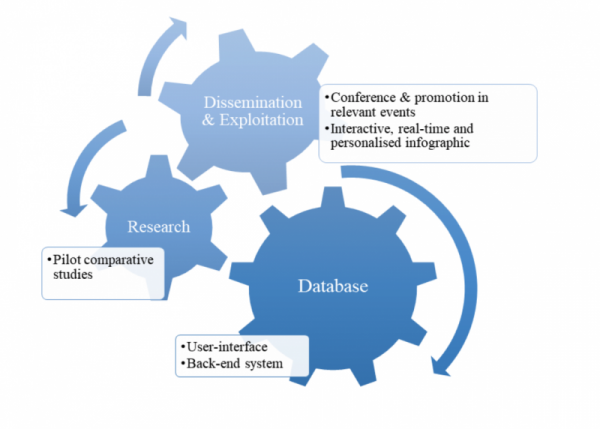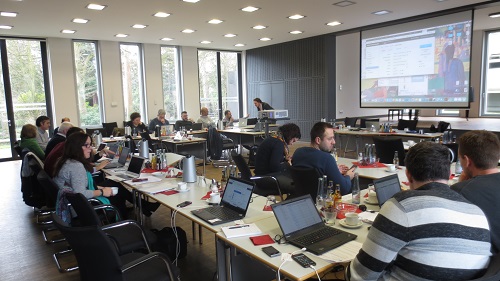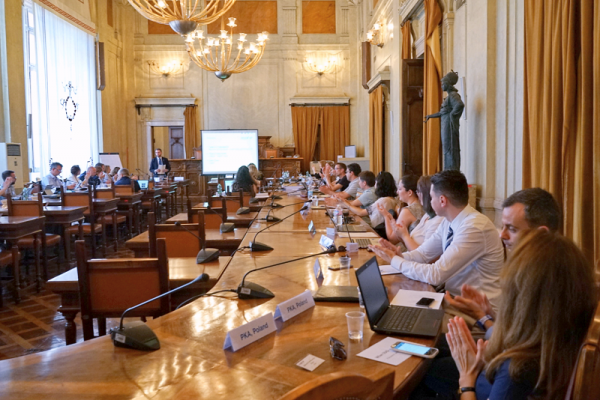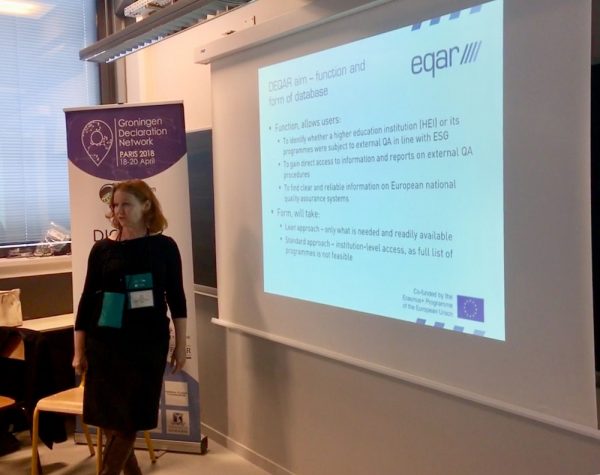Database of External QA Results (DEQAR)
Database development and aims
The development of the Database of External Quality Assurance Results (DEQAR) was a major activity for EQAR throughout 2018. The aim of DEQAR is to allow users to identify whether a higher education institution has been subject to external quality assurance in line with the ESG and to easily access the corresponding quality assurance report(s).
The database aims to reach a broad target audience, including recognition information centres (ENIC-NARICs), recognition officers, the leadership of higher education institutions, policy makers, academics, students and employers.

The development of DEQAR is part of an Erasmus+ Key Action 3 project coordinated by EQAR and includes as partners 17 EQAR-registered quality assurance agencies, the German Accreditation Council (GAC) and the German Rectors’ Conference (HRK), the key European stakeholder organisations in higher education (ENQA, ESU, EUA, EURASHE, Education International, the Italian Information Centre on Academic Mobility and Equivalence (CIMEA) on behalf of the ENIC-NARIC network) and one research centre (Ghent University).

Status quo end of 2018
At the end of 2018, DEQAR included 5676 quality assurance reports covering higher education institutions from 33 EHEA countries and 14 non-EHEA countries. The following tables provide a detailed breakdown by agency and type of reports.
By 31 December, 24 EQAR registered agencies had submitted data to DEQAR; 16 of these were project partners and 8 of these were external to the project.
Coverage in a particular country is defined as the number of higher education institutions in a country with quality assurance reports in DEQAR compared to the total number of higher education institutions in that country, according to the European Tertiary Education Register (ETER) or national lists provided to EQAR.
DEQAR had significant coverage (> 60%) of 11 higher education systems by the end of 2018: Belgium (Flemish community), Croatia, Denmark, Estonia, Finland, Montenegro, North Macedonia, Poland, Romania, Spain and Slovenia.
| Reports | Institutions | Countries | ||
|---|---|---|---|---|
| EHEA | Institutional | 846 | 649 | 27 |
| Programme | 4 728 | 547 | 17 | |
| Non-EHEA | Institutional | 10 | 10 | 7 |
| Programme | 92 | 21 | 9 |
| Agency | Based in | No. of reports in DEQAR | |
|---|---|---|---|
| Institutional | Programme | ||
| A3ES | Portugal | 12 | |
| AAQ | Switzerland | 4 | |
| ACPUA | Spain | 379 | |
| ACSUG | Spain | 390 | |
| AHPGS | Germany | 3 | |
| AI | Denmark | 24 | |
| ANQA | Armenia | 5 | |
| AQU | Spain | 728 | |
| ARACIS | Romania | 176 | 1 555 |
| ASHE | Croatia | 288 | |
| ASIIN | Germany | 377 | |
| BAC | United Kingdom | 33 | |
| EKKA | Estonia | 17 | 143 |
| evalag | Germany | 1 | |
| FINEEC | Finland | 59 | 7 |
| fmid | Spain | 268 | |
| HCERES | France | 201 | |
| IEP | Switzerland | 45 | |
| IQAA | Kazakhstan | 7 | 61 |
| NCPA | Russia | 296 | |
| NVAO | Netherlands | 690 | |
| PKA | Poland | 226 | |
| SQAA | Slovenia | 47 | 543 |
| Unibasq | Spain | 213 | |
Key activities
In January 2018, an initial batch of data on European higher education institutions was imported from the European Tertiary Education Register (ETER) and the Register of Public-Sector Organisations (OrgReg). Between February and May 2018, DEQAR partner agencies were able to experiment with data submission to the database, via the API and CSV submission methods.
On 19-20 March 2018, a Data Collection and Back-end Workshop took place to exchange the experience from the sample data collections and to identify solutions to any problems encountered. The workshop was hosted in the premises of the German Rectors Conference (HRK) in Bonn and organised together with the German Accreditation Council (GAC).

Following some improvements implemented after the workshop, the first production version of the data collection backend was released in April 2018. Soon after, several agencies submitted real data to DEQAR. The DEQAR database user manual has been available since the release to guide agencies in preparing their data and uploading quality assurance reports.
The public preview of DEQAR was launched on 23 May 2018, on the occasion of the EHEA Ministerial Conference.
On 25-26 June 2018, the DEQAR User Interface Workshop took place in Rome, hosted by CIMEA and the Italian Ministry. The workshop gathered participants from 14 different countries, representing DEQAR stakeholder partners and EQAR-registered agencies, both partners in the DEQAR project and others. The workshop allowed participants to reflect on the needs of the different target audiences, to test the user-friendliness of the DEQAR search interface, and to consider possible supporting documentation, tools or guidance for end users. The feedback gathered ranged from improvements to the database that could be implemented immediately, to recommendations that would need to be considered in the long term. A number of improvements of the user interface have been implemented since, e.g. icons to classify reports, clearer search options and additional links between related records. In addition, the information on the legal frameworks in EHEA countries, which provides valuable context for external QA results, was enhanced and improved (see also Knowledge Base of External QA Systems).

Throughout 2018, DEQAR was presented at numerous meetings and conferences reaching the main target audiences of the database. More information about the DEQAR project can be found on the EQAR website.
-
DEQAR project pages
-
Workshop Bonn
-
Workshop Rome
-
Public preview release

Outlook
While the first part of the project was spent developing and populating the database, in 2019 the project will move beyond the database itself and explore further how it can be used beyond looking up quality assurance results as such.
A team from Ghent University has undertaken to produce two pilot studies using the database to explore topics related to how the ESG are reflected in different approaches to external quality assurance. The pilot studies will be published in 2019.
Interactive visualisations of the data will also be produced for the EQAR website and customised to meet the needs of various user groups.
Finally, EQAR will aim to facilitate linking up DEQAR data with other systems – e.g. with information from ETER in the context of the EU’s planned Knowledge Hub or to enable embedding quality assurance information into digitally-issued education credentials/qualifications.